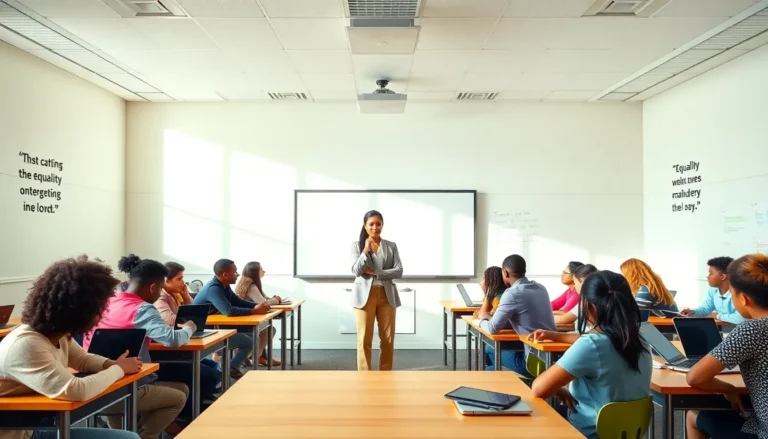In today’s rapidly evolving educational landscape, effective teacher training has never been more crucial. With new teaching methods and technologies emerging, educators must adapt to inspire and engage their students. Comprehensive training programs equip teachers with the skills and knowledge needed to create dynamic learning environments that foster student success.
Quality teacher training not only enhances instructional strategies but also focuses on professional development and emotional intelligence. By investing in teachers, schools can cultivate passionate educators who are prepared to meet diverse classroom challenges. This article explores the importance of teacher training, its impact on student outcomes, and the best practices that can transform educational experiences for both teachers and learners alike.
Table of Contents
ToggleImportance of Teacher Training
Teacher training plays a vital role in shaping effective educational experiences. Comprehensive programs ensure educators develop the necessary skills to foster student engagement and success.
Impact on Student Learning
Effective teacher training directly influences student learning outcomes. Trained educators implement evidence-based practices, adapt to diverse learning needs, and utilize technology effectively. Studies show that schools with well-trained teachers report higher student achievement levels and improved test scores. For instance, research indicates that classrooms led by trained teachers significantly reduce achievement gaps among students from various backgrounds.
Professional Development for Educators
Professional development relies on ongoing teacher training to enhance instructional strategies. Quality training supports educators in refining their pedagogy, learning new skills, and staying updated with educational trends. It empowers teachers with resources to address classroom challenges effectively. Additionally, trained educators are more likely to collaborate with peers, leading to a culture of continuous improvement and innovation in teaching practices.
Types of Teacher Training Programs


Various teacher training programs exist, each designed to prepare educators for the classroom environment. These programs enhance teaching skills and improve educational outcomes for students.
Traditional Degree Programs
Traditional degree programs typically consist of a four-year bachelor’s degree in education or specific subject areas. These programs combine coursework in pedagogy, child psychology, and educational technology with student teaching experiences. Candidates develop a deep understanding of teaching theories and classroom management strategies through structured learning and practical applications. Graduates often obtain state licensure, allowing them to teach in public schools. Examples include Bachelor of Arts in Education or Bachelor of Science in Education, focusing on elementary or secondary education.
Alternative Certification Pathways
Alternative certification pathways cater to individuals seeking to transition into teaching from different career backgrounds. These programs often enable candidates to earn certification in a shorter timeframe, offering flexible schedules to accommodate working professionals. Generally, alternative pathways include online courses, intensive workshops, and classroom practicums. Applicants may possess a bachelor’s degree in an unrelated field or relevant experience. Successful candidates receive state certifications, allowing them to teach while completing additional educational requirements. Notable examples include Teach for America and state-specific alternative certification programs.
Key Components of Effective Teacher Training
Effective teacher training comprises several key components that significantly enhance educators’ skills. These elements ensure a well-rounded approach to preparing teachers for successful classroom experiences.
Curriculum Design
Curriculum design plays a vital role in teacher training, ensuring educators receive relevant and comprehensive content. Effective programs include these key features:
- Alignment with Standards: Training aligns with national, state, and local education standards to provide a framework for teaching.
- Integration of Theory and Practice: Curricula combine theoretical knowledge with practical applications, enabling teachers to apply concepts in real classroom settings.
- Diverse Learning Strategies: Training incorporates various teaching methods, addressing different learning styles and promoting inclusivity.
- Assessment Techniques: Educators learn to utilize formative and summative assessment strategies to gauge student understanding and inform instruction.
Mentorship and Support
- Pairing with Experienced Educators: Novice teachers are paired with mentor teachers, providing guidance and sharing effective practices.
- Regular Feedback: Constructive feedback from mentors and peers fosters professional growth and enhances teaching effectiveness.
- Professional Learning Communities: Teachers engage in collaborative groups that promote sharing of resources, ideas, and strategies.
- Access to Resources: Programs provide ongoing access to training materials, workshops, and additional support to assist teachers throughout their careers.
Challenges in Teacher Training
Teacher training faces various challenges that can hinder the effectiveness of educational programs. Access and affordability, along with balancing theory and practice, are significant concerns in preparing teachers for today’s classrooms.
Access and Affordability
Access to quality teacher training programs varies widely across regions and institutions. While urban areas may offer numerous programs, rural or underserved locations often lack nearby options. Affordability presents another barrier, as many aspiring teachers face rising tuition costs. Research shows that student loan debt contributes to teacher shortages, especially in low-income districts. Alternative training pathways sometimes provide less expensive or flexible options, but these alternatives may not always guarantee comprehensive training.
Balancing Theory and Practice
Balancing theoretical knowledge with practical application remains a critical challenge in teacher training. Educators require a solid understanding of educational theories, pedagogical models, and instructional strategies. Yet, if training programs focus too heavily on theory, new teachers may struggle when they face real-world classroom dynamics. Conversely, overemphasizing practical experience without grounding it in solid theory leads to gaps in understanding foundational concepts. Effective programs integrate both components, allowing educators to develop adaptability and confidence in their teaching methods.
Future Trends in Teacher Training
Emerging trends in teacher training focus on leveraging technology and promoting lifelong learning. These developments are shaping how educators prepare for and adapt to modern classroom challenges.
Technology Integration
Technology integration represents a pivotal trend in teacher training, enhancing learning experiences and instructional methods. Training programs increasingly incorporate digital tools, such as learning management systems and interactive platforms, allowing teachers to engage students and facilitate collaboration effectively. For example, virtual reality applications provide immersive experiences, helping teachers develop innovative lesson plans that cater to diverse learning styles. Additionally, educators gain skills in data analysis to track student progress and personalize instruction. As online resources and e-learning platforms expand, teachers access a wealth of professional development materials, which fosters continuous growth.
Lifelong Learning Opportunities
Lifelong learning opportunities are also essential in shaping effective teacher training. Professional development programs increasingly emphasize ongoing education, encouraging teachers to pursue certifications, workshops, and conferences throughout their careers. For instance, many institutions offer micro-credentialing, allowing educators to gain recognition for mastering specific skills or competencies relevant to their teaching practices. This trend supports adaptability, as teachers learn to implement new methodologies and engage with contemporary issues in education. Furthermore, collaborative initiatives, such as peer observations and mentorship programs, promote growth by enabling educators to share experiences and insights, thereby enhancing overall teaching quality.



